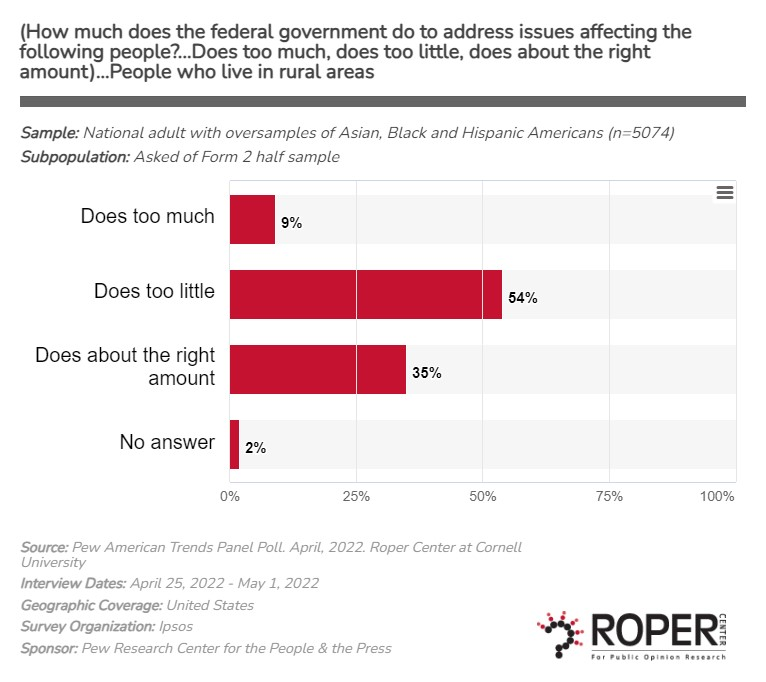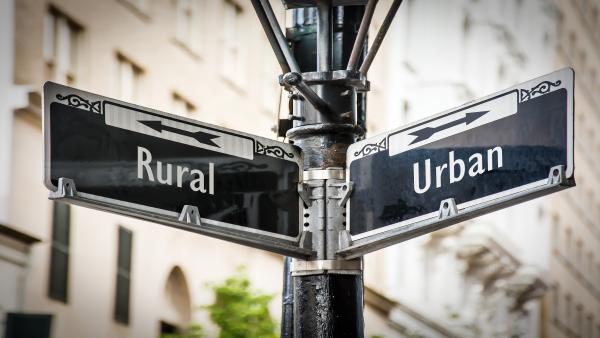However, when examining public beliefs about rural communities, we begin to see how little rural communities are valued. Rural communities face a unique set of challenges: lack of access to quality healthcare; lack of education funding, support, and staffing; and reduced economic opportunities. While both urban and rural communities face social and economic challenges, the national narrative is situated in the urban or city experience. Nevertheless, in a recent survey from the American National Election Studies (ANES), supported by the National Science Foundation (NSF)[JS1] [KW2] , 51% of respondents said they believe that people living in small towns and rural areas receive too little respect from those living in cities. At the same time, a recent Pew American Trends survey found that 54% said the federal government does too little to address issues affecting rural people.

Recognizing and valuing the influence of rural communities on American politics is essential for a well-functioning, inclusive, and representative democracy that effectively addresses the needs and aspirations of all citizens, regardless of their geographic location.
American unity or division has a direct relationship with rural communities and democracy. The unity or division within a society, including how rural and urban communities relate to each other, can significantly impact the functioning of democracy and the well-being of the nation as a whole. According to Cornell researchers Trevor Brown, Suzanne Mettler, and Samantha Puzzi,“the rural-urban divide is contributing to the rise of tribalism, meaning strong loyalty to a group with which one identifies, such as one based on place, race, or religion, and hostility toward those outside of the group…” resulting in “prejudice, including but not limited to racism, xenophobia, and other forms of ethnic-based grievances” (Brown et al. 2021). The researchers note that “these attitudes are especially likely to transform politics if political leaders and politically active organizations accentuate and channel them for political purposes, as conservative organizations and Republican leaders have done in recent years.”
Consistent with this perspective, a May 2021 poll of registered voters in Tennessee found that 87% believe that Americans are divided over the country's most pressing issues today. Conversely, only 9% of respondents in a February 2021 Pew Research Center survey said “there are not conflicts” between people living in cities and those living in rural areas. This statistic paints the picture of unity and division in America today.

As Americans live in an increasingly divided nation, it becomes increasingly essential to revisit the relationship between unity, division, and democracy, particularly regarding the rural-urban relationship. After visiting America in 1831, scholar Alexis de Tocqueville wrote in Democracy in America (2002 [1835]) about unity and social cohesion in America that,
“As soon as several of the inhabitants of the United States have conceived a sentiment or an idea that they want to produce in the world, they seek each other out; and when they have found each other, they unite. From then on, they are no longer isolated men, but a power one sees from afar, whose actions serve as an example; a power that speaks, and to which one listens.”
Thus, unity among diverse communities like rural and urban areas is vital for a healthy democracy. A sense of shared identity, values, and common purpose fosters cooperation, compromise, and willingness to work together for the greater good. When rural and urban communities feel connected and valued, they are more likely to engage constructively in the democratic processes and support policies that benefit the entire nation. American unity and the reduction of division are fundamental for a thriving democracy that upholds the principles of representation, cooperation, and equitable policymaking. Ensuring that rural and urban communities find common ground and work together contributes to a more resilient and prosperous democratic system.
In the end, this leads me to ask if the data show us that social unity and democracy are failing. The data presented here show that Americans don't believe that the federal government is providing fair, equitable resources across communities, which could increase marginalization in rural and urban communities. When people feel like they matter and their community matters, they are more likely to engage in the political process.
Brown, T., Mettler, S., & Puzzi, S. (2021). When Rural and Urban Become “Us” versus “Them”: How a Growing Divide is Reshaping American Politics. The Forum, 19(3), 365–393. https://doi.org/10.1515/for-2021-2029
de Tocqueville, A. (2000). Democracy in America (H. C. Mansfield & D. Winthrop, Eds.; H. C. Mansfield , Trans.). University Of Chicago Press.
National Science Foundation (NSF). 2020. American National Election Studies: 2020 Post-Election Survey. Question 35: 31118727.00172. Cornell University, Ithaca, NY: Roper Center for Public Opinion Research. (https://doi.org/10.25940/ROPER-31118727).
Pew Research Center for the People & the Press. 2021. Pew Research Center: American Trends Panel Wave 82. Question 3: 31118243.00098. Cornell University, Ithaca, NY: Roper Center for Public Opinion Research. (https://doi.org/10.25940/ROPER-31118243).
Vanderbilt University's Center for the Study of Democratic Institutions. 2021. Vanderbilt University Tennessee Survey. Question 10: 31118467.00009. Cornell University, Ithaca, NY: Roper Center for Public Opinion Research.https://doi.org/10.25940/ROPER-31118509
